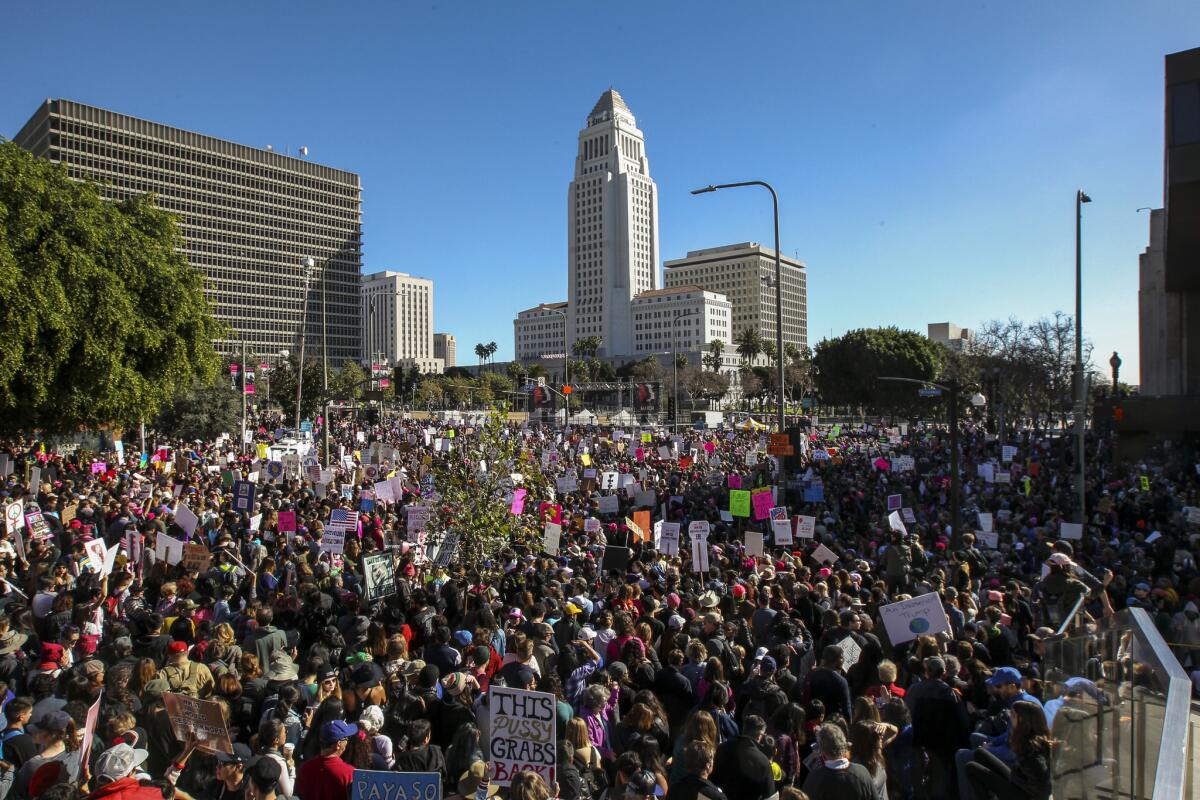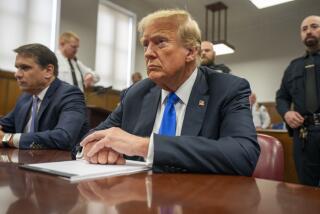Protesters stash bullhorns and hot chocolate, just in case Trump fires Mueller
- Share via
Reporting from Washington — Organizers have stashed bullhorns in apartments and offices near Manhattan’s Times Square. They’ve stockpiled hot chocolate mix and sleeping bags in Salt Lake City. And they’ve started arranging carpools in Houston.
Across the country, activists are making plans, collecting supplies and raising money to swiftly launch hundreds of street protests if President Trump fires Robert S. Mueller III, the special counsel who has been investigating the Trump administration.
“The last thing we want is to be caught unprepared,” said Elizabeth Beavers, a Washington-based policy manager for Indivisible, one of several liberal groups involved in the protest plans.
“We’re on red alert,” agreed Zac Petkanas, a Democratic consultant working with the organizers.
Never mind that Trump and his legal team insist there’s no plan to oust Mueller or otherwise interfere with the investigation into whether the president’s associates helped Russia meddle in the 2016 U.S. presidential election.
Trump’s opponents don’t buy the denials, especially as some Republican lawmakers and conservative commentators have escalated demands for Mueller to get the boot.
The president’s lawyers are expected to meet with the special counsel’s office as early as this week as Trump seeks a public exoneration to remove the cloud over his presidency. Few outside legal experts believe Mueller would offer that promise while the investigation remains underway.
That leaves Mueller’s fate a potent issue for organizing and fundraising in an era when protest politics have become the norm and midterm elections loom on the calendar.
“I went into shock [after the presidential election] and I became politically active almost immediately,” said Mary Louise Ochoa, a retired University of Houston staff member who is helping to organize in the city. “There’s been no respite since then.”

The protests began on Jan. 21, the day after Trump was sworn into office, when hundreds of thousands of women gathered in Washington and other cities in a kind of counter-inauguration.
After Trump tried to ban immigrants and refugees from seven Muslim-majority countries in his first week, thousands of protesters flocked to LAX and other airports. Courts blocked the executive order, although the Supreme Court recently allowed a modified version to take effect.
Next came protests and lawsuits against Trump’s immigration crackdown, his attempt to ban transgender people from the military and his rollback of clean air standards. There was a March for Science to oppose cuts to research budgets and environmental regulations, and a March for Truth to support an independent investigation into allegations of Russian collusion.
Indeed, Trump has turbocharged the country’s left-leaning activists. Liberal groups focused on issues such as climate change and the sexual abuse of women have been flooded with new members and money, just as conservative and tea party groups beefed up to oppose President Obama’s policies.
In perhaps the most dramatic example, the American Civil Liberties Union raked in $24 million in online donations in just one weekend after Trump took office. That was six times the $4 million it normally raises online each year.
Emily’s List, which supports pro-choice Democratic candidates, announced Wednesday that 25,000 women have contacted the organization since the election to discuss running for office. That compares with 920 women in the two years before the 2016 election.
“What we’re seeing now is like nothing we’ve seen before in our history,” said Alexandra De Luca, the Emily’s List press secretary. “This is building a pipeline for cycles to come.”
Organizers said firing Mueller would mobilize Trump’s opponents as few issues have done in the past.
“This is different from the kind of overreaches we’ve seen from the Trump administration already,” said David Sievers, campaign director for MoveOn.org, a liberal advocacy group.
So far, Mueller’s team has filed criminal charges against four former Trump aides. Trump’s former campaign manager, Paul Manafort, and his deputy, Richard Gates, have pleaded not guilty to money laundering, conspiracy and fraud. Michael T. Flynn, who served 24 days as Trump’s national security advisor, and George Papadopoulos, a campaign advisor, have pleaded guilty to lying to the FBI and have agreed to cooperate with prosecutors.
As the investigation advances, Republicans have increasingly tried to portray Mueller’s team as fueled by partisan animus. Fox News talk show host Jeanine Pirro, a former judge and prosecutor, called for a “cleansing” at the Department of Justice with some officials taken “out in handcuffs.”
The scathing rhetoric has rattled activists, who remember how Trump boasted that he fired FBI Director James B. Comey in May because of “this Russia thing.” Top Democrats have suggested Mueller is investigating Comey’s ouster as possible obstruction of justice.
History suggests protests are unlikely to affect the president’s decisions, at least in the short term. Hundreds of thousands of Americans regularly protested the Vietnam War in the late 1960s, but U.S. combat troops were not withdrawn until 1973 and U.S. involvement dragged on for two more years.
Protests also erupted during the Watergate scandal when President Nixon tried to fire independent special prosecutor Archibald Cox in 1973. Atty Gen. Elliot Richardson and Deputy Atty. Gen. William Ruckelshaus resigned rather than do so. The acting attorney general, Robert Bork, carried out Nixon’s order, completing the so-called Saturday Night Massacre.
Follow live coverage of the Trump administration on Essential Washington »
Some protesters gathered outside the White House holding signs that read: “Honk if you want him impeached.” (Police handed $5 citations for “excessive noise” to some drivers who honked.) But Nixon’s use of executive power led to a harsh backlash in Congress and public opinion.
“The reaction from the media, the Democrats and even some Republicans was so fast and furious that Nixon backed down pretty fast,” and Bork appointed Leon Jaworksi as another special prosecutor, said David Greenberg, a Rutgers University professor who has studied the Watergate era.
Still, Nixon did not resign for another 10 months.
David S. Meyer, a UC Irvine sociology professor who wrote a book called “The Politics of Protest,” said there are some signs that anti-Trump demonstrators are producing the kind of electoral energy that would be needed for Democrats to retake control of Congress in 2018 and the White House in 2020.
“The connection between protest politics and mainstream politics is the challenge for people going out into the streets right now,” Meyer said. “It’s always an uphill battle.”
But organizers face a challenge waiting for Trump to move on Mueller. For starters, they don’t know when or if they will be needed.
“We don’t actually want this to happen,” said Shannon Stagman, 33, who has been preparing a New York protest with Empire State Indivisible. “The best-case scenario here is that all of this planning was for naught and we don’t need to hold these events.”
If Mueller is fired before 2 p.m., protesters would gather at 5 p.m. If it happens after 2 p.m., they would start at noon the next day.
As soon as the news breaks, Stagman said, organizers would hold a conference call to plan next steps. Then they’d collect their bullhorns and tell protesters to beeline to Times Square, where they would march about two miles downtown to Union Square.
They’ll have extra signs ready. But they’re still scrounging up lighting in case their rally happens after dark.
“It’s going to be kind of last-minute,” Stagman said.
Twitter: @chrismegerian
ALSO:
Trump’s lawyers want second special counsel as Republicans turn up the heat on Mueller investigation
More to Read
Get the L.A. Times Politics newsletter
Deeply reported insights into legislation, politics and policy from Sacramento, Washington and beyond. In your inbox three times per week.
You may occasionally receive promotional content from the Los Angeles Times.











